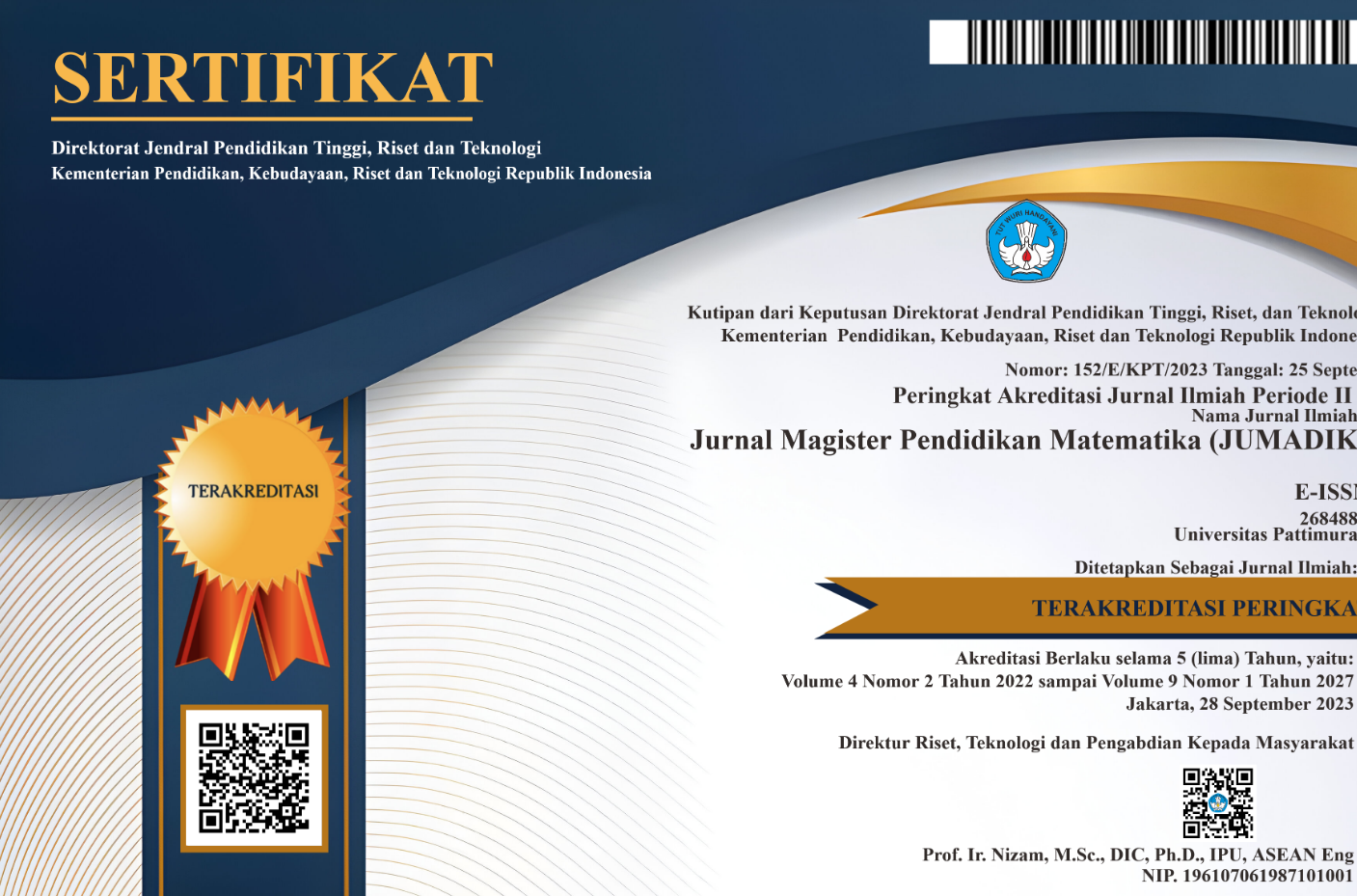THE TRANS LEVEL CHARACTERISTICS ABOUT INFINITE SERIES
Abstract
Infinite series is one of the difficult calculus material for students. It needs to be analyzed the cognitive activities of students to make it easier for lecturers to arrange learning plans. The purpose of this study is to describe the characteristics of the trans level about infinite series. The subject of this research was a student of Mathematics Education, one of the universities in Bengkulu. A total of 5 people were selected from 29 students based on their cognitive abilities. Subjects were interviewed based on the assignment given. Data is analyzed through its genetic decomposition. The results of the study are that subjects can coordinate other objects and processes, so that the scheme is formed about the convergence of infinite series and sequences. Conclusion: the subject is able to do thematization so that forming a mature scheme is a trance level characteristic.
Downloads
References
Daftar Pustaka
Baker, B., Cooley, L., Trigueros, M., & Trigueros, M. (2000). A Calculus Graphing Schema. Journal for Research in Mathematics Education, 31(5), 557=578. https://doi.org/10.2307/749887
Brijlall, D., & Bansilal, S. (2011). Student Teachers ’ Engagement With Re-Contextualized Materials : A Case of Numerical Approximation. US-China Education Review, 5(June), 691–702.
Cooley, L., Trigueros, M., & Baker, B. (2007). Schema Thematization: A Framework and an Example. Journal for Research in Mathematics Education, 38(4), 370–392. https://doi.org/10.2307/30034879
Dubinsky, E. (2000). Using a Theory of Learning in College Mathematics Courses. MSOR Connections, 1(2), 10–15. https://doi.org/10.11120/msor.2001.01020010
Dubinsky, E. (2010). Using a Theory of Learning in College Mathematics Courses. MSOR Connections, 1(2), 10–15. https://doi.org/10.11120/msor.2001.01020010
Dubinsky, E., & Mcdonald, M. A. (2001). APOS : a Constructivist Theory of Learning in Undergraduate Mathematics Education. Netherlands: Kluwer Academic Publishers.
Glaser, B. G., & Strauss, A. . (1980). The Discovery of Grounded Theory. New York: Aldinie de Gruyster Inc. Bogdan.
Gray, E., & Tall, D. (2007). Abstraction as a Natural Process of Mental C o m p r e s s i o n. Mathematics Education Research Journal, 19(2), 23–40.
Herawaty, D., Widada, W., Novita, T., Waroka, L., & Lubis, A. N. M. T. (2018). Students’ metacognition on mathematical problem solving through ethnomathematics in Rejang Lebong, Indonesia. Journal of Physics: Conference Series, 1088. https://doi.org/10.1088/1742-6596/1088/1/012089
Herawaty, D, & Rusdi, R. (2016). Increased Capacity Of The Understanding Of The Concept And The Ability To Solve Problems Through The Implementation Of The Model Of Teaching Mathematics Realistic Based On Cognitive Conflict Students. Journal of Mathematics Education (Infinity), 5(2), 109–120. https://doi.org/10.22460/infinity.v5i2.217
Herawaty, D., & Widada, W. (2018). The Influence of Contextual Learning Models and the Cognitive Conflict to Understand Mathematical Concepts and Problems Solving Abilities. Advances in Social Science, Education and Humanities Research, 218(ICoMSE 2017), 96–102. https://doi.org/10.2991/icomse-17.2018.17
Jr, D. C., & Vidakovic, D. (2015). Developing Student Understanding: The Case of Proof by Contradiction.
Suharto, S., & Widada, W. (2019a). The Cognitive Structure of Students in Understanding Mathematical Concepts. Advances in Social Science, Education and Humanities Research, Volume 295, 295(ICETeP 2018), 65–69.
Suharto, S., & Widada, W. (2019b). The Contribution of Mathematical Connection and Mathematical Communication to Problem Solving Ability. International Journal of Science and Research (IJSR), 8(1), 155–159.
Tsamir, P., & Dreyfus, T. (2002). Comparing Infinite Sets - a process of abstraction. TheCase of Ben. In The Journal of Mathematical Behavior, 21(1).
Tziritas, M. (2011). APOS Theory as a Framework to Study the Conceptual Stages of Related Rates Problems. Analysis, (September), 213.
Widada, W. (2002). Teori APOS sebagai Suatu Alat Analisis Dekomposisi Genetik terhadap Perkembangan Konsep Matematika Seseorang. Journal of Indonesian Mathematicel Society (MIHMI), 8(3).
Widada, W. (2006). Dekomposisi Genetik Mahasiswa dalam Mempelajari Teori Graph. Jurnal Ilmiah Multi Science Inspirasi, Monograph.
Widada, W. (2015). The Existence of Students in Trans Extended Cognitive Development on Learning of Graph Theory. Jurnal Math Educator Nusantara, 1(1), 1–20.
Widada, W. (2016). Profile Of Cognitive Structure Of Students In Understanding The Concept Of Real Analysis. Journal of Mathematics Education (Infinity), 5(2), 83–98. https://doi.org/10.22460/infinity.v5i2.215
Widada, W., & Herawaty, D. (2017). Dekomposisi Genetik tentang Hambatan Mahasiswa dalam Menerapkan Sifat-sifat Turunan. Jurnal Didaktik Matematika, 4(2), 136–151. https://doi.org/10.24815/jdm.v4i2.9216
Widada, W., Herawaty, D., Umam, K., Nugroho, Z., Falaq, A., & Anggoro, D. (2019). The Scheme Characteristics for Students at the Level of Trans in Understanding Mathematics during Etno- Mathematics Learning. Advances in Social Science, Education and Humanities Research, 253(Aes 2018), 417–421.
Widada, W., Sunardi, H., Herawaty, D., Pd, B. E., & Syefriani, D. (2018). Abstract Level Characteristics in SOLO Taxonomy during Ethnomathematics Learning. International Journal of Science and Research (IJSR), 7(8), 352–355. https://doi.org/10.21275/ART2019438
Zazkis, R., & Campbell, S. (1996). Divisibility and Multiplicative Structure of Natural Numbers: Preservice Teachers’ Understanding. Journal for Research in Mathematics Education, 27(5). https://doi.org/10.2307/749847
Copyright (c) 2019 JUMADIKA : Jurnal Magister Pendidikan Matematika

This work is licensed under a Creative Commons Attribution-NonCommercial-ShareAlike 4.0 International License.
License and Copyright Agreement
In submitting the manuscript to the journal, the authors certify that:
- They are authorized by their co-authors to enter into these arrangements.
- The work described has not been formally published before, except in the form of an abstract or as part of a published lecture, review, thesis, or overlay journal. Please also carefully read Jurnal Magister Pendidikan Matematika (JUMADIKA) Posting Your Article Policy.
- That it is not under consideration for publication elsewhere,
- That its publication has been approved by all the author(s) and by the responsible authorities – tacitly or explicitly – of the institutes where the work has been carried out.
- They secure the right to reproduce any material that has already been published or copyrighted elsewhere.
- They agree to the following license and copyright agreement.
Copyright
Authors who publish with Jurnal Magister Pendidikan Matematika (JUMADIKA) agree to the following terms:
- Authors retain copyright and grant the journal right of first publication with the work simultaneously licensed under a Creative Commons Attribution-NonCommercial-ShareAlike 4.0 International License (http://creativecommons.org/licenses/by-nc-sa/4.0/) that allows others to share the work with an acknowledgment of the work's authorship and initial publication in this journal.
- Authors are able to enter into separate, additional contractual arrangements for the non-exclusive distribution of the journal's published version of the work (e.g., post it to an institutional repository or publish it in a book), with an acknowledgment of its initial publication in this journal.
- Authors are permitted and encouraged to post their work online (e.g., in institutional repositories or on their website) prior to and during the submission process, as it can lead to productive exchanges, as well as earlier and greater citation of published work.








